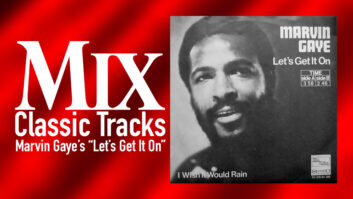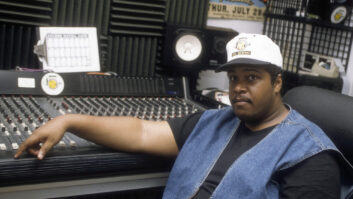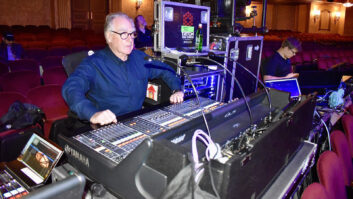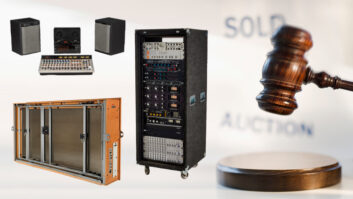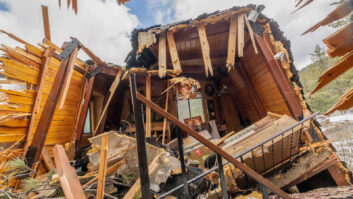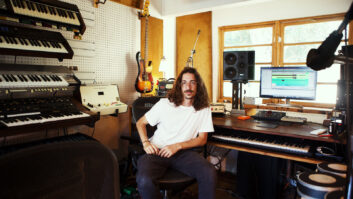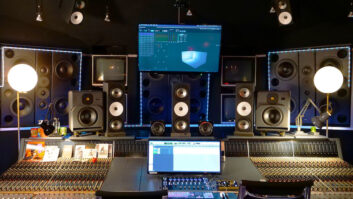
— CLASP™ devotee Brian Kolb knew that Clayton Anderson’s rich country music sound would benefit from the warmth of Endless Analog’s critically acclaimed CLASP —
Nashville-based producer/engineer Brian Kolb knows talent when he hears it, and he knows how to achieve the sounds that bring out the best in each artist, proven by his track record with such acts as Jerrod Niemann, for whom he engineered last year’s number-one album Judge Jerrod and the Hung Jury. When he began working with rising country star Clayton Anderson, there was no doubt in his mind that the project should be recorded in its entirety using Endless Analog’s CLASP™ (Closed Loop Analog Signal Processor) system, which uniquely integrates analog tape into the digital audio workstation environment.
Kolb states, “First of all, I love working with CLASP, for a number of reasons. But especially for Clayton’s
project, I knew this is exactly what it needed. It just made a lot of sense for his songs to use analog tape in the recording process, and in today’s studio environment, CLASP is really what you need to make tape happen, while still using the workflow and editing tools of DAWs like Pro Tools. The album was self-funded on a tight budget, and we were working at Ocean Way, one of Nashville’s very best studios, so time was money. We needed to track everything – ten songs – in a single day. CLASP eliminates the need for rewinding or changing tape reels, and it makes hybrid analog/digital overdubs and punch-ins a breeze. Without CLASP, there is no way we could have accomplished these sessions using analog tape. We’d still be rewinding!�
Anderson, an Indiana native who has fine-tuned his act on the road around the Midwest and Southeast, is more than pleased with the result. “Brian explained CLASP to me during pre-production, and I was really intrigued by it. My music has always been about a grassroots fan base and an old-school live show, so the earthy, old-school sound of classic recordings that analog tape brings to the table fit these songs like a glove. I don’t have a producer’s ear like Brian does, but as soon as we started tracking, I could definitely hear the difference using CLASP, which I thought was pretty cool. Since the record came out this summer, a lot of fans have come up and told me how much they love the record, and how it’s a fresh sound. They can’t exactly put their finger on it, but we know that CLASP is a huge part of that. It’s not the sound they’re used to hearing, and that’s something I am very proud of. And personally, the sessions felt very natural to me. I felt like I was standing on stage with the band, which is where I’m most comfortable.�
Kolb remembers the day of tracking as efficient yet surprisingly stress-free. “We did an extreme amount of work for a record in one day, and it was awesome to be able to do that with analog tape. I remember that Lonnie Wilson, one of our session players, came in and saw the Studer tape machine set up. He joked, ‘Uh oh. I’m going to have to play good today, right?’ I explained CLASP to him, and that we’d still be able to punch and edit, and he was immediately on board. All the instruments sounded so great. The drums and bass in particular. We cut everything at 30 ips, and there were a couple of songs where I had the bass and the electric guitars replay at 15 ips, and that’s what we ended up using. Ocean Way is such amazing room, and that old console, with tape to top it off, really shines. It was just so much fun. It was my first time in that room, so it was exciting to be able to get in there and be able to do it all the right way. And the monitoring in the headphones was something that everybody was commenting on – it wasn’t the normal delay going through Pro Tools, it was the real-time monitoring that CLASP does, so everybody noticed how present, punchy and clear things were. They didn’t even necessarily know what was different, but they knew something was superior to other sessions. Things just locked, like magic.�
Anderson remembers the next day following the Ocean Way sessions, when he and Kolb gathered to review the recordings. He recalls, “I came in there, and Brian said, ‘You’ve got to hear this.’ He hadn’t done anything to it yet. It was just straight off the board. It sounded incredible, and his face said it all. He kept saying, ‘This doesn’t happen normally.’ And even when I was listening to the rough reference disc in my car, it still had that huge sound to it, before final mixes and mastering.�
When Kolb got to the final mixing stage, he felt like much of his work had already been done. He notes, “Sonically, it was just there. It was so warm and just wanted to sit right there where it sits in my mix. It’s so much easier mixing on sessions tracked with CLASP. You have that tape compression, which is a presence that you don’t get from the digital world or a digital compressor. Also, the EQ is different. On a mix of sessions using CLASP, you don’t have to take out brittle frequencies on the high end and the muddiness on the low end. I’m not trying to fix a sound – I’m telling it to do what I want it to do instead, which is a far better approach.�
And all the hard work paid off. Upon its release, the resulting album Torn Jeans & Tailgates debuted at number 17 on the iTunes Country Albums chart, a significant accomplishment for an independent project. And Anderson’s long-time fans have been thrilled with the album and its first single “Summer Sun,� which is still receiving rave reviews on iTunes. Anderson sums up the project the same way he sums up his career up to this point: “No record label, no backing money, no sponsorship, no nothing. Just an old grassroots thing, like the old guys used to do it. And my fans are loving it.�
Visit www.endlessanalog.com and www.claytonandersonofficial.com for more information.

